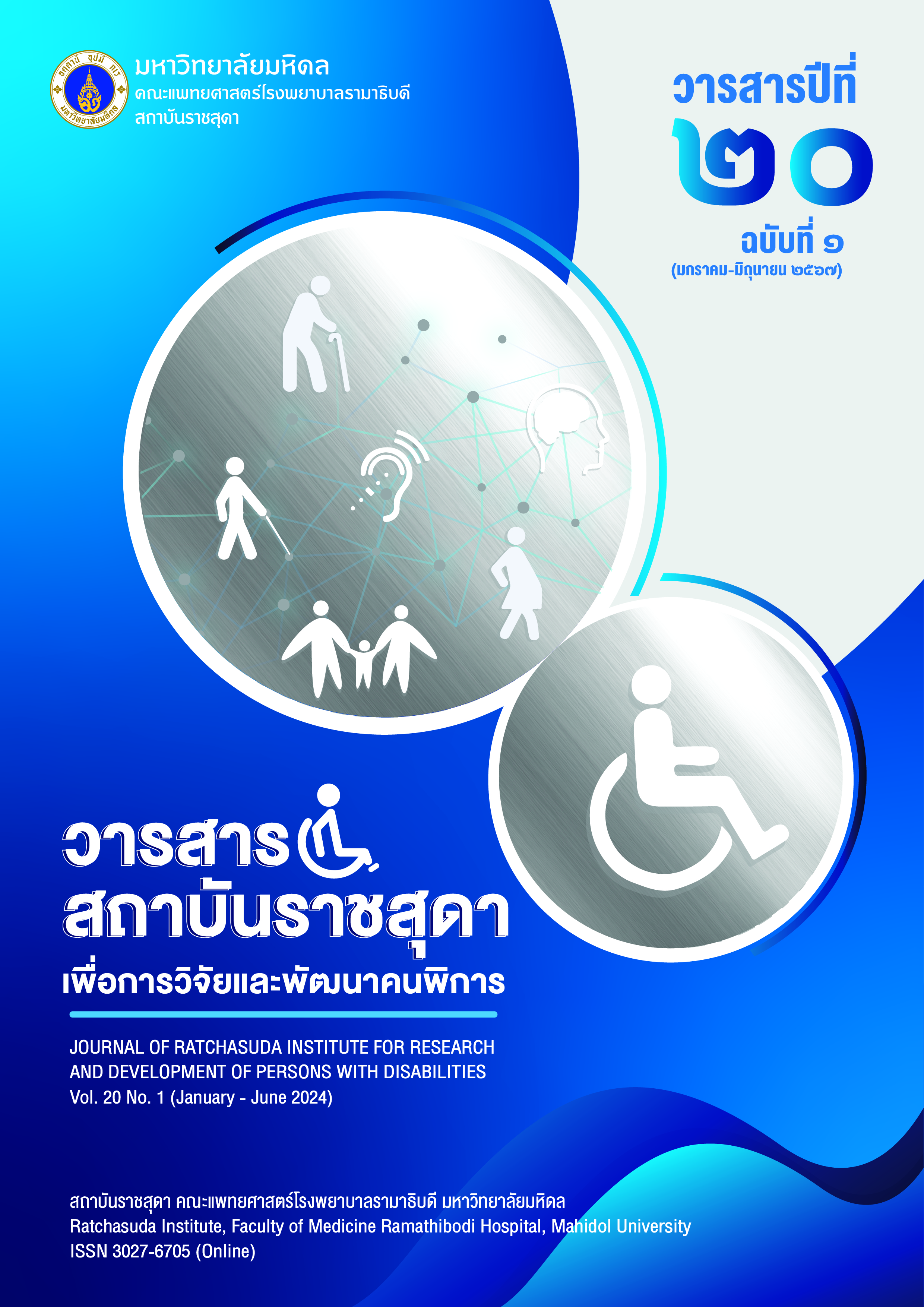The Influence of Micro-Foundations of Institutional Logic on Community-Based Rehabilitation (CBR) Programs in Thailand
Keywords:
Institutional logic, Micro-foundations of institutional logic, Community-Based RehabilitationAbstract
This article illustrates the role of microfoundations of institutional logics as the mediators shaping behavior and interactions within Community-Based Rehabilitation (CBR) Programs, which influences the conceptual framework and practical implementation encompassing both material and symbolic aspects. The findings explain that the CBR Programs consists of seven micro-institutes constituting the foundations of institutional logic. These include local government agencies, health-promoting hospitals, communities, people with disabilities (PWDs), families, corporations, and non-governmental organizations (NGOs). The diversity of these micro-foundations coupled with the authority of state regulations and medical professionals have influenced the CBR Programs in three phenomena in order to maintain the gaps between material and symbolic practices, including the temporary decoupling of the logic, the creation of diverse practices in CBR activities, and the reinforcement of embedded logic, conflict and competing logics at macro- and micro-level. Since the institutional powers from state and professional institutes at the micro-level strictly dominate the formal practice framework proposed by the CBR Programs, therefore, the intention and objective of CBR are providing welfare and medical rehabilitation rather than empowering PWDs organizations. This dominance of states and professionals impedes the program to create a hybrid organization to meet the community context. This article recommends that the government agency should define and provide authority structure to the CBR institution and to formulate strategies in order to transform CBR into a community -centric institution mobilizing the CBR Programs to benefit other communities across Thailand. In addition, the state agencies and professional organizations should clarify the concept of empowerment within the CBR Programs. This collaborative effort should define the role of government organizations in creating a new framework to enhance the quality of life for PWDs within the community.
Downloads
References
Bualar, T., & Ahmad, M. M. (2009). Why does Community-Based Rehabilitation fail physically disabled women in northern Thailand? Development in Practice. https://doi.org/10.1080/09614520802576351
Ferreira, L. C. (2017). Using institutional logics as cultural resources: A micro-perspective on organizational hybridity [Doctoral dissertation, University of Nottingham]. Nottingham eTheses. https://eprints.nottingham.ac.uk/40568/
Cheausuwantavee, T. (2005). Community based rehabilitation in Thailand: Current situation and development. Asia Pacific Disability Rehabilitation, 16(1), 51-67. https://rs.mahidol.ac.th/thai-1/thai-old/research/research-article/International/2005/Community%20%20%20Based%20%20%20Rehabilitation%20%20in%20%20Thailand.pdf
Cheausuwantavee, T. (2009). Appropriateness and consciousness in community based rehabilitation through participatory action research. The Review of Disability Studies. 5(3): 53-63. and http://www.biasfree.org/operation.pdf
Friedland, R., & Alford, R. R. (1991). Bringing society back in: Symbols, practices and institutional contradictions. In Powell, W. W., & DiMaggio, P. (Eds.), The new institutionalism in organizational analysis (pp. 232-267). The University of Chicago Press.
Hamid, L.N., Kobusingye, O., Baine, O.S., Mayora, C., & Bentley, J. (2017). Disability characteristics of community- based rehabilitation participants in Kayunga district, Uganda. Annals of Global Health, 83(3-4), 478-388. https://doi.org/10.1016/j.aogh.2017.10.006
Holm, P. (1995). The dynamics of institutionalization: transformation processes in Norwegian fisheries. Administrative Science Quarterly, 40(3), 398-422. https://doi.org/10.2307/2393791
Jackall, R. (1988). Moral mazes: The world of corporate managers. Oxford University Press.
Lounsbury, M., & Crumley, E. T. (2007). New practice creation: An institutional perspective on innovation. Organization Studies, 28(7), 993–1012. https://doi.org/10.1177/0170840607078111
McMullin, C., & Skelcher, C. (2018). The impact of societal-level institutional logics on hybridity: Evidence from nonprofit organizations in England and France. Voluntas, 29(5), 911-924. doi: 10.3233/WOR-131795.
Moniruzzaman, Saha, P. C., & Habib, Md. M. (2013). Community Based Rehabilitation: Does it really improve the level of productivity among persons with physical disabilities?. Work, 50(3), 395–401. https://doi.org/10.3233/wor-131795
Rehman, F. (1999). Woman, secluded culture and community based rehabilitation: An example from Pakistan. Saudi Journal of Disability and Rehabilitation, 5(1), 16-20.
Ruef, M., Scott, W. R., Mendel, P., & Caronna, C. (2000). Institutional change and health care organizations: From professional dominance to managed care. University of Chicago Press.
Samakeetham, S. (2010). The establishment of power of the powerless (1st ed). MachalongBoon CSB.
Sangsorn, R. (1998). The Study of child's disability with community- based rehabilitation: The case study of Bua Yai district Nakhon Ratchasima province [Unpublished master's thesis]. Thammasat University.
Scott, W. R., Ruef, M., Mendel, P. J., & Caronna, C. A. (2000). Institutional change and health care organizations: From professional dominance to managed care. University of Chicago Press.
Thavornkit, K. (1995). The attitudes and understanding of CBR through operator of the public welfair organization in 75 provinces of Thailand [Unpublished master's thesis]. Thammasat University.
Thornton, P. H., Ocasio, W., & Lounsbury, M. (2013). The institutional logics perspective: A new approach to culture structure, and process. Oxford University Press.
Thornton, P. H., & Ocasio, W. (1999). Institutional logics and the historical contingency of power in organizations: Executive succession in the higher education publishing industry, 1958– 1990. American Journal of Sociology, 105(3), 801-843. https://doi.org/10.1086/210361
World Health Organization. (2010, May, 12). Community-based rehabilitation: CBR guidelines. https://www.who.int/publications/i/item/9789241548052

Downloads
Published
How to Cite
Issue
Section
License
Copyright (c) 2024 Journal Of Ratchasuda Institute for Research and Development of Persons With Disabilities

This work is licensed under a Creative Commons Attribution-NonCommercial-NoDerivatives 4.0 International License.
บทความที่ได้รับการตีพิมพ์เป็นลิขสิทธิ์ของวารสารสถาบันราชสุดาเพื่อการวิจัยและพัฒนาคนพิการ





